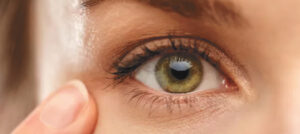By: Alina Stanciu, MD, FACS, FAAO, FASRS
Board Certified Ophthalmologist, American Academy of Cosmetic Surgery
 Meibomian Gland Dysfunction (MGD) is one of the leading causes of dry eye disease worldwide, affecting millions of patients across all age groups and demographics. The meibomian glands, strategically located within the tarsal plates of both upper and lower eyelids, play a vital role in maintaining optimal tear film stability by secreting essential lipids that form the outermost layer of the tear film. These specialized oils create a protective barrier that significantly slows down tear evaporation and prevents rapid desiccation of the ocular surface. When these critical glands become blocked, inflamed, or produce poor-quality oils, patients inevitably develop evaporative dry eye syndrome, resulting in persistent discomfort, visual disturbances, and compromised ocular health that can significantly impact daily activities.
Meibomian Gland Dysfunction (MGD) is one of the leading causes of dry eye disease worldwide, affecting millions of patients across all age groups and demographics. The meibomian glands, strategically located within the tarsal plates of both upper and lower eyelids, play a vital role in maintaining optimal tear film stability by secreting essential lipids that form the outermost layer of the tear film. These specialized oils create a protective barrier that significantly slows down tear evaporation and prevents rapid desiccation of the ocular surface. When these critical glands become blocked, inflamed, or produce poor-quality oils, patients inevitably develop evaporative dry eye syndrome, resulting in persistent discomfort, visual disturbances, and compromised ocular health that can significantly impact daily activities.
Clinical Presentation
Patients with MGD typically present with a constellation of uncomfortable symptoms including persistent burning sensations, sharp stinging, bothersome gritty feelings as if sand particles are trapped beneath the eyelids, noticeable redness, and pronounced light sensitivity that can interfere with routine tasks. A hallmark characteristic is fluctuating vision quality that temporarily improves immediately after blinking, only to deteriorate again within seconds as the tear film destabilizes. The condition follows a chronic and progressive course, significantly impacting overall quality of life and daily functioning. Contact lens wearers often experience particular difficulty with lens tolerance and comfort, while individuals with extensive screen exposure find their symptoms markedly exacerbated during prolonged digital device use, particularly in air-conditioned environments.
Risk Factors
Multiple risk factors contribute to MGD development, with age-related physiological changes being among the most significant predictors. Post-menopausal hormonal fluctuations, particularly decreased androgen levels, substantially increase susceptibility. Inflammatory skin conditions including rosacea and seborrheic dermatitis create a predisposing environment for gland dysfunction. Modern lifestyle factors such as prolonged digital device use lead to decreased blink frequency and incomplete blinks, compromising natural gland expression. Certain systemic medications including isotretinoin, antihistamines, and antidepressants can alter gland function and oil composition, while environmental factors like low humidity and air conditioning further exacerbate symptoms.
Diagnostic Approaches
Comprehensive evaluation involves detailed slit-lamp examination of the eyelids and meibomian gland orifices to assess structural changes and inflammatory signs. Manual expression of the glands helps evaluate secretion quality, consistency, and flow characteristics, while tear breakup time (TBUT) measurements objectively assess tear film stability. Modern meibography imaging technology provides detailed visualization of gland architecture and morphology, enabling early detection of structural changes before significant functional impairment occurs, allowing for proactive intervention strategies.
Management Strategies
Treatment approaches are carefully tailored to individual disease severity and patient needs. Conservative first-line measures include warm compresses, gentle lid massage, and consistent lid hygiene protocols. Adjunctive therapies encompass lipid-based artificial tears, omega-3 fatty acid supplementation, and prescription anti-inflammatory drops such as cyclosporine or lifitegrast. Low-dose oral doxycycline provides anti-inflammatory benefits beyond antimicrobial effects. Advanced in-office procedures include thermal pulsation therapy (LipiFlow), intense pulsed light treatment (IPL), and BlephEx for thorough lid margin cleansing. Essential lifestyle modifications encompass adequate hydration, conscious blinking exercises, humidifier use, and strategic screen time reduction with regular breaks.
Specialized Treatment at Naples Eye & Aesthetics Institute
At our office, we offer comprehensive, personalized approaches to MGD and dry eye disease. We proudly introduce Bella Piel MD, our proprietary eyelid cream developed to stimulate meibomian gland function and restore healthy tear film stability. This innovative treatment provides patients with a targeted, non-invasive option that effectively complements traditional therapies. For detailed evaluation by our Dry Eye Expert Team and Dr. Alina Stanciu, MD, FACS, FAAO, FASRS, please contact our office at 239-949-2020.
Alina K. Stanciu, MD, FACS, FAAO, FASRS
Dr. Stanciu is a Board Certified Eye Physician and Surgeon who is a diplomate of the American Board of Ophthalmology, American Society of Retinal Surgery, and Fellow Member of the American Academy of Cosmetic Surgery. She is the Founder and Medical Director of Naples Eye & Aesthetics Institute and MediFace Spa.
Specializations & Expertise: Dr. Stanciu specializes in Advanced Cataract Surgery, Retinal Diseases, Comprehensive Eye Care, Dry Eye Expert, and Oculo-Facial Surgical Procedures. As a Medical Retina Specialist and Cataract Surgeon, she treats patients with Macular Degeneration, Diabetic Retinopathy, and Glaucoma. She is also a skilled Cosmetic Surgeon with expertise in minimally invasive facial rejuvenation and eyelid surgery.
Innovative Treatments: Dr. Stanciu developed The European Liquid Face Lift, which serves as the best alternative to surgical face lift procedures. Her areas of interest include minimally invasive facial rejuvenation and Blepharoplasty for drooping eyelids.
Experience & Training: With 20 years of experience and New York training, Dr. Stanciu has been practicing in Naples and Bonita for two decades. She operates the only boutique private practice in Naples, recently relocating to a new location at 6610 Willow Park Dr, Suite 104, Naples, FL.
Leadership & Innovation: As Founder and President of Naples Eye & Aesthetics Institute and MediFace Spa, Dr. Stanciu has also developed Bella Piel MD, a cosmetic line specializing in anti-aging and dry eye treatment with amazing results.
Philosophy of Care: Her personal approach to patient care is to treat each individual as you would a loved one, ensuring personalized attention and the highest standard of care for every patient.
239-949-2020 | www.MediFaceSpa.com









